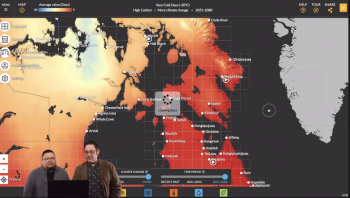Image Caption
Summary
Local Journalism Initiative Reporter
Windspeaker.com
Almost four years after the Climate Atlas of Canada was launched, Indigenous knowledge is now a featured component.
The interactive climate atlas is the work of the Prairie Climate Centre at the University of Winnipeg. It projects climate change looking at high carbon and the increased temperatures between now and 2050.
That atlas now includes climate data for all 634 First Nations communities across Canada, all 53 Inuit communities, and projects across the Métis homeland.
“It isn’t just the context or the contents of this work that is being done…but the process that was taken based on respect, based on connection and understanding of one another and how we can build that from western science, southern universities, with Indigenous communities,” said Siila Watt-Cloutier, Inuk climate change advocate.
“That is the way to go forward on the issues that we need to go forward with and this is the time to strike while that iron is hot, to be able to really do this. And so this is timely, this is timely on so many fronts,” she said.
Watt-Cloutier in 2007 was nominated for the Nobel Peace Prize for her ground-breaking work linking climate change and human rights.
This Indigenous knowledge aspect of the map was many years in the making, said Hetxw'ms Gyetxw (Brett Huson), research associate with the PCC, which connected with knowledge keepers, Elders and youth across the country to make it happen.
It builds on the first national climate portal that was launched in 2018 and included projections for climate change impact on urban centres in Canada. But that was a colonial project, said Ian Mauro, who is non-Indigenous.
“We also knew it was wholly inadequate. That we needed to see Indigenous place names, that we needed to see Indigenous territories on this map…We’ve been able to do something truly tremendous,” said Mauro, executive director of the PCC.
Now the portal includes Indigenous knowledge along with climate change projections for every Indigenous community.
“This is about how Indigenous knowledge relates to climate change, adaptation. How colonization has impacted climate change and what it means to bring Indigenous knowledges into climate change research,” said Hetxw'ms Gyetxw.
Terry Duguid, parliamentary secretary for Environment and Climate Change Canada, said in a statement that the inclusion of Indigenous knowledge is “a significant national contribution that demonstrates how climate research and Indigenous ways of knowing can respectfully be brought together to advance reconciliation, climate preparedness and protection of the environment.”
The interactive map includes videos, films, information and articles about projects and initiatives being undertaken by Indigenous communities, climate activism, and perspectives of Elders and youth.
“(It shows) how Indigenous knowledge and science affects and impacts research in the north and across the country,” said Hetxw'ms Gyetxw.
The map is an important tool for risk management, adaptation planning, and creating resilience, said Mauro.
While Indigenous is the broad term used for the knowledge provided, Mauro stressed that the map takes a distinctions-based approach with First Nations, Métis and Inuit able to share their own stories.
“The Métis Nation has a strong desire to be part of the solution for climate change, and as Métis people we have a lot to offer. It is important for all Canadians to understand how the Métis have both historically been involved and continue to be involved in climate action today,” said Cassidy Caron, president of the Métis National Council.
“Climate change poses one of, if not the biggest, challenge to our citizens and our communities right now. As Métis we are intrinsically tied to the land and we have to do our part to protect it now and for our future generations,” said Caron.
The MNC helped fund this project as did the Assembly of First Nations.
“We need to be gathering all the knowledge that we can to make the best decisions for our people. And that is a balance of the traditional knowledge and in this case what western modern science can show us,” said AFN Yukon Regional Chief Kluane Adamek, whose portfolio includes environment and climate.
First Nations continue to be leaders in this space, said Adamek. The information available through the climate atlas provides important information that allows First Nations to be able to respond to changes.
Also helping to fund the project was Environment and Climate Change Canada and the Social Sciences and Humanities Research Council.
The map can be accessed at Climate Change in Canada | Climate Atlas of Canada and the Indigenous knowledges icon in the left-side legend leads to the Indigenous information.
Local Journalism Initiative Reporters are supported by a financial contribution made by the Government of Canada.

